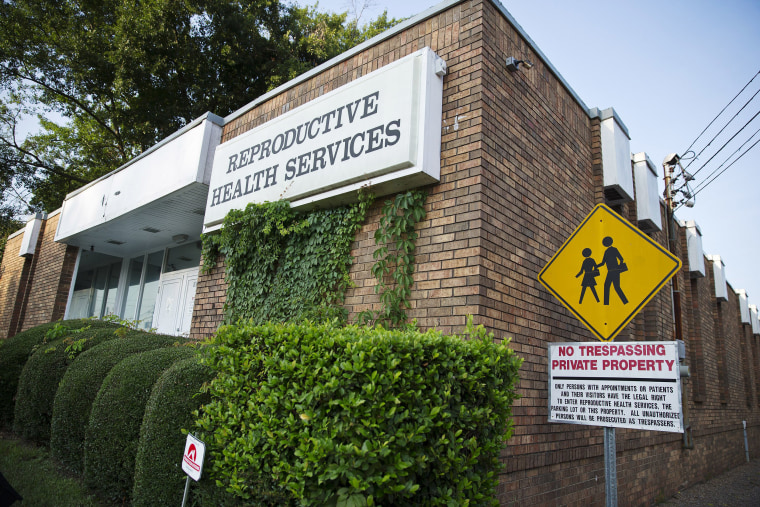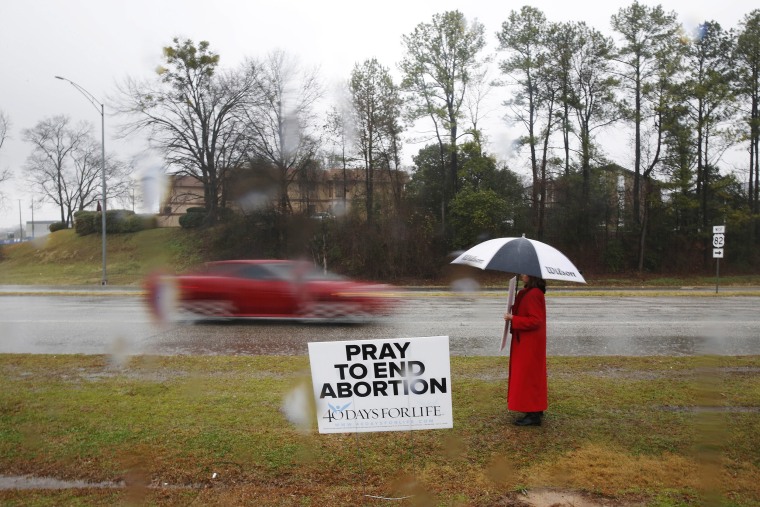MONTGOMERY, Ala. — The six people sitting on the porch have just returned from a protest supporting women’s reproductive rights outside the state capitol and are already planning their next one.
This boisterous group of activists calls its rainbow flag-flanked antebellum home the POWER (People Organizing for Women's Empowerment and Rights) House. In between planning rallies, organizing resources and holding meetings, the groups's volunteers escort women who are seeking services at the clinic next door.
The clinic, Reproductive Health Services, is one of three abortion clinics left in the state of Alabama.
“In the late ’90s, we had over 20 clinics in the state. And now, in 2019, we have three for the whole state,” Mia Raven, founder and director of POWER House, said.
Raven and other POWER House members stood on the steps of the Alabama State House on Thursday morning to protest HB314, a bill that amounts to a near total ban on abortions.
As lawmakers showed up to vote, the women held up signs that read, “Abortion Is a Human Right.”
The fight became so heated among lawmakers during Thursday’s Senate Judiciary Committee that the vote was postponed until Tuesday.
“If you get rid of abortions, essentially, it's not going to go away. It's just going to get more dangerous,” said Bianca Cameron-Schwiesow, a clinic escort for POWER House.
The volunteers at POWER House say Reproductive Health Services is the only clinic between Tampa, Florida, and Jackson, Mississippi.
"That's why we have so many women from Louisiana, Florida, Georgia," Raven said, describing how difficult it is for women to access trained physicians.
Alabama is one of more than a dozen states with laws requiring women to make two trips to an abortion clinic. Raven said this is particularly difficult for low-income women who "can't afford child care or a place to stay or gas, even, just to come here and back."
Raven and volunteers at POWER House help the women who are seeking services at the clinic next door.
"Protesters screaming and yelling at them, calling them 'murderers,' calling them all sorts of names," she said. The volunteers meet women at their cars, hold their hands, help them to the clinic front doors so they aren't accosted by any of the protesters. If women bring their children to the clinic, volunteers help babysit or offer their own homes for women to stay if they are coming from out of town and don't have enough money for a hotel.
Cameron-Schwiesow and two other women dressed as handmaids for Thursday's protest at the Alabama State House.
“We’re here to shame. Shame on them for doing this to women, shame on them for their war on women and trying to eliminate health care that women need here in this state, desperately,” she said.
Under the Alabama legislation, doctors could face up to 99 years in prison for performing an abortion procedure.
In the version passed by the state House, the only exception would be regarding the mother's health. A Senate committee added an exception for rape, but the Senate suddenly tabled the exemptions for rape and incest Thursday.
One Alabama couple, Rex and Wanda Ponder, who said they are expecting their first grandson in the next few months, believe abortion should be illegal throughout the entire country.
“The body is created by God and he created women with the ability to have a child,” Rex Ponder said. “We have a responsibility to what God gave us."
The Alabama bill is sponsored by Republican State Rep. Terri Collins who said in a statement, "passage of this bill will reflect the conservative beliefs, principles, and desires of the citizens of Alabama."

If it passes, the legislation is expected to face legal challenges.
In the statement issued before the bill’s turbulent appearance on the Senate floor, the American Civil Liberties Union of Alabama warned, “If the full Senate and governor insist on passing this bill, they will see us in court.”
But for many lawmakers, the bill isn’t about a change in Alabama as much as it is about overturning Roe v. Wade nationwide.
For Collins, the bill is "providing a vehicle to revisit the constitutionally-flawed Roe v. Wade decision," her statement noted.
Nearly one in four women in the United States will have an abortion by age 45, according to a 2017 study from the Guttmacher Institute, a reproductive health research organization.
“Everyone loves someone who’s had an abortion,” Raven said.
Raven admitted the bill passing wouldn’t be a shock to her, but she never expected it to pass so quickly.
“Extremists are starting here in the South to prevent women from having abortions, and they’re working their way outward,” Cameron-Schwiesow said.
“These blue states need to come pay attention, fund us, help fight us,” she warned, “because otherwise, their rights are going to go away too, and they won’t be enjoying that either. They’re next.”

